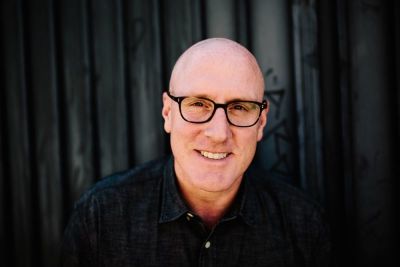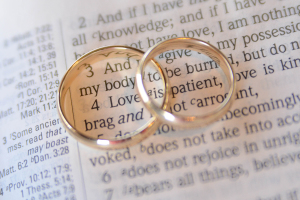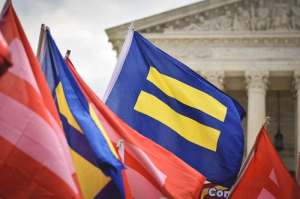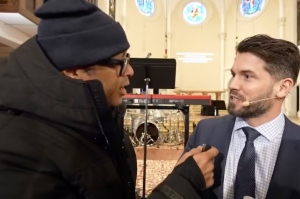Religious persecution is skyrocketing during coronavirus pandemic

The coronavirus pandemic has escalated religious persecution against Christians and other minority groups abroad.
Before the coronavirus became a global health crisis, more than 60 countries were already rife with mass surveillance, forced marriages, and violent attacks targeting religious minorities. But while much of the world grinds to a halt during stay-at-home orders, religious persecution is escalating at an alarming pace. The coronavirus is becoming a catalyst for faith-based discrimination internationally.
Days before COVID-19 emerged in Wuhan, China; I was in that region on a fact-finding mission where I witnessed firsthand the outsized efforts of the Chinese regime to curtail the spread of religious ideas they deem threatening. Mass surveillance placed a target on the backs of minorities, including Christians and Uighur Muslims, by reducing their access to education and employment as punishment for their perceived disloyalty.
Christians in China were worshipping under government cameras long before the pandemic began, but now their resilience is tested further. One Wuhan pastor reports they are rising to the challenge of worship and community service under quarantine. “A virus can’t stop us,” he said to Open Doors USA.
My research mission is one of many conducted by Open Doors USA to track religious persecution worldwide. The findings in China are consistent with those in North Korea, Iran, and Pakistan, where Christians are consistently treated as second-class citizens, traitors, and infidels. Now, as the coronavirus ravages the health and livelihoods of all people, Christians and other religious minorities in Asia are facing a new punishment: discriminatory distribution of emergency relief and medical care.
Asia isn’t the only offending region. In another hostile country where our organization operates covertly due to religious violence, Christian nurses — who are seen as more expendable — are being assigned to the riskiest coronavirus cases.
“We are dispensable,” one Christian relief worker told Open Doors. “It is very painful to see people neglected and ignored because of their faith.” She goes on to explain how she is classified as one of “the filthy people” because she wears a cross necklace. Health care employees considered loyal to the state-sponsored religion, on the other hand, are assigned the less contagious patients in her facility.
In Somalia, an Islamic extremist group al-Shabaab said, as reported by the BBC, that COVID-19 spreads “by the crusader forces who have invaded the country and the disbelieving countries that support them.” Their message – that religious minorities are somehow responsible for the outbreak – incites violence toward anyone suspected of disbelief in Islam, in Somalia and surrounding countries.
Open Doors reports that economic discrimination is the second-most prevalent form of persecution toward men in the Middle East and North Africa. As a result, many Christians in the region are forced into low-paid jobs due to religious discrimination. Additionally, those who convert to Christianity from other faiths are often disowned by their families, leaving them without a financial safety net or support system.
Christians in India are under similar pressure. Many were day laborers before the 21-day lockdown, but now they are struggling to even feed their families. The coronavirus crisis has caused significant job loss, leaving many of them without income. The result is a large number of people in urgent need of food, shelter, and medical care.
In total, 25 of the countries currently reporting cases of COVID-19 are on Open Doors’ 2020 World Watch List, an annual ranking of the world’s worst persecutors of Christians. In each of these contexts, religious minorities face additional barriers — from health care discrimination to reduced access to social services — in battling COVID-19.
There’s no gentle way to say this: Religious persecution is multiplying exponentially in the wake of coronavirus. Yet it’s critically important to distinguish between religiously-motivated discrimination and the U.S. governmental restrictions to contain the virus.
While this unprecedented suspension of civil rights has businesses, religious leaders, and human rights advocates rightfully wary, the stay-at-home orders appear to be equally shared across all parts of society. For churches and Christians in the U.S., coronavirus isolation is an opportunity to look to persecuted people of faith as a model of how to respond.
The religious minorities that our organization seeks to protect rarely respond defensively, but rather strive to show compassion. They treat the sick, shelter those at risk, provide food to their neighbors, and offer spiritual encouragement to each other – in secret and from a distance – as they have always done.
Perhaps the faith-infused response is for American Christians to use this period of quarantine to remember the more than 200 million Christians worldwide who worship in isolation – before and after the coronavirus. To listen to their cries and learn from their stories. And most of all, to resolve support and advocacy for the beautiful souls who are doubly vulnerable in times of crisis and scarcity.
David Curry is CEO of Open Doors USA, a nonprofit organization working to empower Christians living under religious persecution in more than 60 countries. For more information, visit OpenDoorsUSA.org.



























